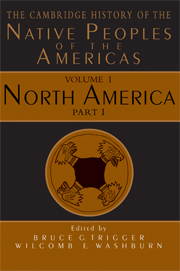Book contents
- Frontmatter
- 1 Native views of history
- 2 Native peoples in Euro-American historiography
- 3 The first Americans and the differentiation of hunter-gatherer cultures
- 4 Indigenous farmers
- 5 Agricultural chiefdoms of the Eastern Woodlands
- 6 Entertaining strangers: North America in the sixteenth century
- 7 Native people and European settlers in eastern North America, 1600–1783
- 8 The expansion of European colonization to the Mississippi Valley, 1780–1880
- Index
- References
1 - Native views of history
Published online by Cambridge University Press: 28 March 2008
- Frontmatter
- 1 Native views of history
- 2 Native peoples in Euro-American historiography
- 3 The first Americans and the differentiation of hunter-gatherer cultures
- 4 Indigenous farmers
- 5 Agricultural chiefdoms of the Eastern Woodlands
- 6 Entertaining strangers: North America in the sixteenth century
- 7 Native people and European settlers in eastern North America, 1600–1783
- 8 The expansion of European colonization to the Mississippi Valley, 1780–1880
- Index
- References
Summary
On January 2, 1971, a fieldworker for the Doris Duke Oral History Project was collecting narratives in Tuba City, Arizona. To warm up one conversation the interviewer opened John McGregor’s Southwestern Archaeology (second edition) to page 114 and through an interpreter asked an elderly Navajo man what he thought of a map of North America with swooping arrows indicating the routes supposedly walked by Paleo-Indian peoples after they crossed over the Beringia Land Bridge to populate the continent.
When he couldn’t get a straight answer his translator begged for patience, “he’s telling it little by little,” then added, “it doesn’t sound very little to me though.” The interpreter and informant put their heads together. “He said that he would like to tell you,” the translator explained, “but … he will be punished for it … I mean the medicine, he can’t tell how it works … he said that if he told all his secrets like that he would fall to pieces. ….”
As for the migration routes from Western Alaska down into North America, “He said, ‘that maybe some other guys came over like that, but us Navajos came a different way’.” At this the old man launched into what sounded like contradictory origin stories. One was a fragmentary narrative in which cicada-like insects “won this world for us, won this land here, the reservation” after crawling up through the earth’s underlayers. The second account had white corn kernels, “actually the mother of the Navajo tribe,” and the sun, “the father,” talking together, with Navajos born from the corn kernel’s underarms.
- Type
- Chapter
- Information
- Publisher: Cambridge University PressPrint publication year: 1996
References
- 6
- Cited by

